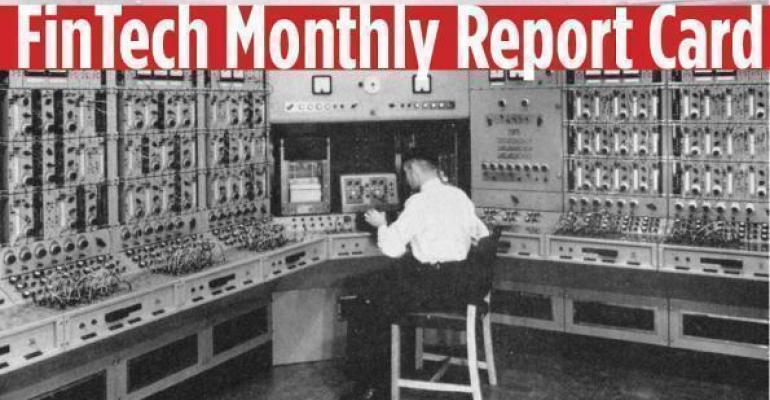BlackRock Invests In Acorns
 What happened: BlackRock, the $6.3 trillion money manager has become an anchor investor in Acorns, an app that allows investors to put spare change from everyday purchases into diversified exchange traded fund portfolios. The firms said they will partner on new technology they can provide for Acorns users.
What happened: BlackRock, the $6.3 trillion money manager has become an anchor investor in Acorns, an app that allows investors to put spare change from everyday purchases into diversified exchange traded fund portfolios. The firms said they will partner on new technology they can provide for Acorns users.
Why it matters: Acorns has fashioned a role for itself not as a robo advisor but as a self-directed saving and micro-investing tool with a business model that just might work. With 1.9 million funded accounts and more than $803 million in assets under management, it’s going to be interesting to see how Acorns puts its new BlackRock cash to work.
Fidelity Creates Virtual Reality Financial Agent
 What happened: Fidelity’s research and development division built a virtual “financial agent” that can interact with a client’s vocal commands. The agent, called Cora, greets users in a VR environment and pulls up charts based on spoken cues. This project was a collaboration between Fidelity and Amazon, which provided the VR environment. “It’s a bit early to say just how VR will catch on in finance, but I think it can go a long way to developing the trust and transparency that are so crucial to successful client interactions,” said Ebbe Altberg, CEO of Linden Lab, the company behind the online virtual world, Second Life, and developer of the social VR platform Sansar. “Putting an actual avatar to a large, faceless banking entity can make a client feel heard, cared for, and comforted, and can lead to deeper relationships over time.”
What happened: Fidelity’s research and development division built a virtual “financial agent” that can interact with a client’s vocal commands. The agent, called Cora, greets users in a VR environment and pulls up charts based on spoken cues. This project was a collaboration between Fidelity and Amazon, which provided the VR environment. “It’s a bit early to say just how VR will catch on in finance, but I think it can go a long way to developing the trust and transparency that are so crucial to successful client interactions,” said Ebbe Altberg, CEO of Linden Lab, the company behind the online virtual world, Second Life, and developer of the social VR platform Sansar. “Putting an actual avatar to a large, faceless banking entity can make a client feel heard, cared for, and comforted, and can lead to deeper relationships over time.”
Why it matters: Every one of these I’ve seen hasn’t worked well: not simple enough to be a robot and not helpful enough to be a human. The jury’s still out on whether this latest VR agent will fare any different.
Coinbase Developing Investor Tools
 What happened: Coinbase is developing tools to lure institutional investors onto its platform. They include custodial services where investors can store large amounts of digital currencies, as well as enhanced trading capabilities, such as risk management and margin trading. One such service, called Coinbase Prime, will offer lending, margin financing and over-the-counter trading.
What happened: Coinbase is developing tools to lure institutional investors onto its platform. They include custodial services where investors can store large amounts of digital currencies, as well as enhanced trading capabilities, such as risk management and margin trading. One such service, called Coinbase Prime, will offer lending, margin financing and over-the-counter trading.
Why it matters: I have no idea if crypto will work as a real value exchange, but if it does, Coinbase is establishing itself as the platform to do it on and investing a ton in making tools to attract investors. Will it work?
Wealthfront Launches College Planning Tool
 What happened: Wealthfront added college tuition capabilities to Path, a planning tool that projects future college tuition, room and board, financial aid and more for a number of post-secondary institutions using data from the National Center for Education Statistics. Users without children are able to project costs for future children or for someone else they’d like to help with college expenses. Path incorporates all accounts and user data so that changes to rates of college savings interact with other savings options available in the tool, like retirement goals and real estate savings.
What happened: Wealthfront added college tuition capabilities to Path, a planning tool that projects future college tuition, room and board, financial aid and more for a number of post-secondary institutions using data from the National Center for Education Statistics. Users without children are able to project costs for future children or for someone else they’d like to help with college expenses. Path incorporates all accounts and user data so that changes to rates of college savings interact with other savings options available in the tool, like retirement goals and real estate savings.
Why it matters: Everybody deserves a thumbs up every once in a while. For those who want self-directed financial planning, Wealthfront has done a great job building that platform. This college planning tool just adds another layer of value for them.
Envestnet Adding Annuities
 What happened: Envestnet plans to add insurance to its ever-expanding list of products. The Envestnet Insurance Exchange will connect insurance carriers with large financial institutions to make it easier for advisors to include insurance in their financial planning and wealth management services. It will include fixed, fixed-indexed, variable, contingent-deferred and private placement annuities. Envestnet plans to eventually integrate Insurance Exchange into its other distribution channels, including Tamarac, Envestnet’s technology platform for registered investment advisors.
What happened: Envestnet plans to add insurance to its ever-expanding list of products. The Envestnet Insurance Exchange will connect insurance carriers with large financial institutions to make it easier for advisors to include insurance in their financial planning and wealth management services. It will include fixed, fixed-indexed, variable, contingent-deferred and private placement annuities. Envestnet plans to eventually integrate Insurance Exchange into its other distribution channels, including Tamarac, Envestnet’s technology platform for registered investment advisors.
Why it matters: Envestnet is creating a way for fee-only RIAs to still provide access to insurance products where it’s appropriate, and Envestnet can pick up some of that revenue. It’s a smart play that’s compatible with the fiduciary era and can drive a lot of revenue growth.
Schwab Opening Startup Hubs in San Francisco and Austin
 What happened: Charles Schwab announced two new digital accelerator hubs in Austin, Texas, and San Francisco to open later this year, designed to function as startups within the company. Schwab says the hubs will be staffed by hundreds of current and yet-to-be-hired employees, tasked with developing better digital experiences for retail investors and advisors.
What happened: Charles Schwab announced two new digital accelerator hubs in Austin, Texas, and San Francisco to open later this year, designed to function as startups within the company. Schwab says the hubs will be staffed by hundreds of current and yet-to-be-hired employees, tasked with developing better digital experiences for retail investors and advisors.
Why it matters: Good for Schwab to try, but I’m a little skeptical of big companies trying to create startups within their walls. There’s more to startups than having a cool office in downtown Austin. The big guys lack the greatest driver for startup success—a driving need to take big risks or risk failing spectacularly. Can that feeling be manufactured? I’m interested to see what happens.
Parent Company of NYSE Reportedly Developing a Bitcoin Platform
 What happened: The parent company of the New York Stock Exchange is working on an online trading platform that would allow large investors to buy and hold bitcoin. The news of the virtual exchange came from emails after Goldman Sachs went public with its intention to open a bitcoin trading unit—most likely the first of its kind at a Wall Street bank according to The New York Times. Details of the platform that Intercontinental Exchange is working on have not been finalized and the project could still fall apart, given the hesitancy among big Wall Street institutions to accept crypto. A spokesman said that the company had no comment.
What happened: The parent company of the New York Stock Exchange is working on an online trading platform that would allow large investors to buy and hold bitcoin. The news of the virtual exchange came from emails after Goldman Sachs went public with its intention to open a bitcoin trading unit—most likely the first of its kind at a Wall Street bank according to The New York Times. Details of the platform that Intercontinental Exchange is working on have not been finalized and the project could still fall apart, given the hesitancy among big Wall Street institutions to accept crypto. A spokesman said that the company had no comment.
Why it matters: I’m just not a believer in crypto as a mainstream investment option yet; it’s still a wildly early technology whose promise lies more in distributed ledger technology and less in value exchange. But time will tell.
TD Ameritrade’s Veo One Platform Integrates with YCharts
 What happened: TD Ameritrade unveiled the full-scale integration of its Veo One platform with research provider, YCharts. Advisors using Veo One already have access to over 150 third-party applications, and can now use YCharts via a single sign-on. Existing YCharts customers can access proprietary research reports on client-held securities while reviewing client positions, as well as toggle between the full YCharts product and Veo One without logging out.
What happened: TD Ameritrade unveiled the full-scale integration of its Veo One platform with research provider, YCharts. Advisors using Veo One already have access to over 150 third-party applications, and can now use YCharts via a single sign-on. Existing YCharts customers can access proprietary research reports on client-held securities while reviewing client positions, as well as toggle between the full YCharts product and Veo One without logging out.
Why it matters: This is yet another neat integration for Veo One, which is allowing TD Ameritrade to distinguish itself with advisors through its commitment and openness to integrating with best-of-breed, third-party technology providers.
Bitwise Cuts Crypto Fund Fees for Larger Investors
 What happened: Bitwise Asset Management, which launched its cryptocurrency index fund, HOLD 10, last year is adding an “institutional pricing structure,” which translates to a fee cut for larger investors. The move is meant to appeal to single and multifamily offices that are drawn to the product because of its low correlation with other asset classes. The passive index fund tracks a market-cap-weighted index of the top 10 cryptocurrencies and will now have weekly liquidity, a feature added after investors indicated an interest in more regular rebalancing. Accounts with more than $1 million in net deposits saw their management fee reduced to 2 percent, while the $25,000 investment minimum is still managed for 2.5 percent.
What happened: Bitwise Asset Management, which launched its cryptocurrency index fund, HOLD 10, last year is adding an “institutional pricing structure,” which translates to a fee cut for larger investors. The move is meant to appeal to single and multifamily offices that are drawn to the product because of its low correlation with other asset classes. The passive index fund tracks a market-cap-weighted index of the top 10 cryptocurrencies and will now have weekly liquidity, a feature added after investors indicated an interest in more regular rebalancing. Accounts with more than $1 million in net deposits saw their management fee reduced to 2 percent, while the $25,000 investment minimum is still managed for 2.5 percent.
Why it matters: Investing in bitcoin to get diversification from your other asset classes is like wanting exposure to transportation stocks and investing in a Mars landing. Diversification? To paraphrase the Princess Bride, “You keep using that word. I do not think it means what you think it means." Less fees or not, you may not get the kind of diversification you were hoping for.





